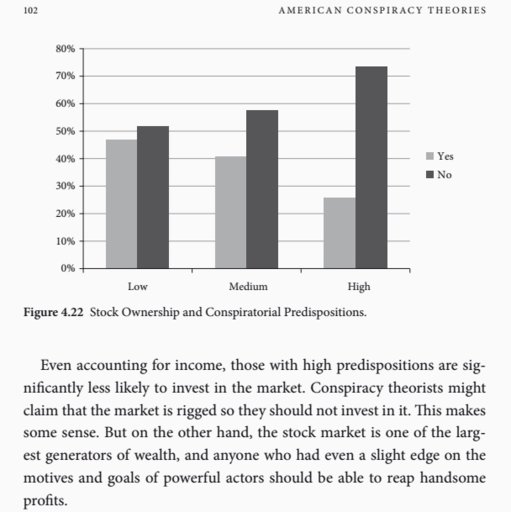McGurnicle
Member
A lot of conspiracism is motivated by political and religious ideology. Libertarians want unfettered capitalism so it's to their advantage to vilify government. Religious fundamentalists oppose secularism so it's politically expedient for them to demonize secular culture as a deliberate construction of Satanic elites. Most of the major conspiracy theorists are from one or both of these camps. The paranoid style is effective in whipping up hysterical support for crank political theories and religious extremism. This is a standard criticism of conspiracy culture and I think it's a valid one, but there is another type of conspiracy theorist, one who doesn't hold radical or extreme views but winds up down the rabbit hole all the same. It's this type I want to focus on because I was on the path to becoming this type of conspiracist.
I've always pretty much been a religious agnostic and a political moderate, I've never really held strong opinions in those areas and I try to be reasonable and fair minded by at least attempting to understand issues from all the relevant perspectives. I've found that on most issues every side has at least one or two valid point so it's always a good idea keep an open mind and take the time to carefully consider different viewpoints. It was in the course of researching one of these contentious issues that I confirmed a sort of shocking explanation of the structure and function of one of our major institutions. The explanation itself wasn't controversial, it's accepted by everyone who has bothered to look into it, it's just most people aren't aware of how the sausage is made and when you find out it's pretty hard to believe at first. That led me to scrutinize many other major institutions, and in most cases what I found was very disconcerting. I became disoriented, what was once for me a decent society by, for, and of the people now appeared to be an undemocratic plutocracy, a system "for the benefit of knaves at the cost of fools" where everything is corrupt and nothing can be trusted.
Now there are many prominent people on both the left and the right who have been saying essentially this for a long time and none of them could be considered "conspiracy theorists", in itself that perspective is largely legitimate. My close call with the rabbit hole came after those revelations and began with the question: If this is true, then what can't be? If people are clueless enough to allow rampant corporatism, private control of the money supply, mass consolidation of corporate controlled media, money in politics, mass surveillance, etc, with none of it ever being mentioned in school or in the media, then maybe Illuminati type grand conspiracies aren't so far fetched after all?
I did begin to look into many of the different claims for who's behind it all and what the ultimate agenda might be and I found a lot of interesting obscure facts and footnotes that do lend support to those ideas. I won't lie, for a while I was half convinced that there was something to it although I never really settled on any one theory. I think what really saved me from full blown delusion is the skeptics and debunkers who maintain an active presence on conspiracy forums and keep blogs that show up in search results on conspiracy related queries. Maybe I encountered the skeptics just in time before the paranoia really took hold and I was still able to recognize good sense when presented with it.
I always try to tell conspiracy leaning people that debunkers are your best friends, that if you're really interested in synthesizing the most reasonable, coherent perspective then you really do need to let honest skeptics tear into your ideas and be willing to let go of rationally untenable commitments. And for conspiracists of my type that usually works, because there the conspiriacism is just due to simple confusion or disorientation, these types really just need to get their bearings and learn to practice some critical thinking. This type of conspiracy theorist is low hanging fruit for the skeptic, they can be reasoned out of the nonsense because they reasoned their way into it. The other type is much more difficult to get through to because their conspiricism is ideologically motivated.
Anyway, I hope that might provide a little more insight into the conspiracy phenomenon, and maybe help skeptics tailor their approach when engaging with the different types.
I've always pretty much been a religious agnostic and a political moderate, I've never really held strong opinions in those areas and I try to be reasonable and fair minded by at least attempting to understand issues from all the relevant perspectives. I've found that on most issues every side has at least one or two valid point so it's always a good idea keep an open mind and take the time to carefully consider different viewpoints. It was in the course of researching one of these contentious issues that I confirmed a sort of shocking explanation of the structure and function of one of our major institutions. The explanation itself wasn't controversial, it's accepted by everyone who has bothered to look into it, it's just most people aren't aware of how the sausage is made and when you find out it's pretty hard to believe at first. That led me to scrutinize many other major institutions, and in most cases what I found was very disconcerting. I became disoriented, what was once for me a decent society by, for, and of the people now appeared to be an undemocratic plutocracy, a system "for the benefit of knaves at the cost of fools" where everything is corrupt and nothing can be trusted.
Now there are many prominent people on both the left and the right who have been saying essentially this for a long time and none of them could be considered "conspiracy theorists", in itself that perspective is largely legitimate. My close call with the rabbit hole came after those revelations and began with the question: If this is true, then what can't be? If people are clueless enough to allow rampant corporatism, private control of the money supply, mass consolidation of corporate controlled media, money in politics, mass surveillance, etc, with none of it ever being mentioned in school or in the media, then maybe Illuminati type grand conspiracies aren't so far fetched after all?
I did begin to look into many of the different claims for who's behind it all and what the ultimate agenda might be and I found a lot of interesting obscure facts and footnotes that do lend support to those ideas. I won't lie, for a while I was half convinced that there was something to it although I never really settled on any one theory. I think what really saved me from full blown delusion is the skeptics and debunkers who maintain an active presence on conspiracy forums and keep blogs that show up in search results on conspiracy related queries. Maybe I encountered the skeptics just in time before the paranoia really took hold and I was still able to recognize good sense when presented with it.
I always try to tell conspiracy leaning people that debunkers are your best friends, that if you're really interested in synthesizing the most reasonable, coherent perspective then you really do need to let honest skeptics tear into your ideas and be willing to let go of rationally untenable commitments. And for conspiracists of my type that usually works, because there the conspiriacism is just due to simple confusion or disorientation, these types really just need to get their bearings and learn to practice some critical thinking. This type of conspiracy theorist is low hanging fruit for the skeptic, they can be reasoned out of the nonsense because they reasoned their way into it. The other type is much more difficult to get through to because their conspiricism is ideologically motivated.
Anyway, I hope that might provide a little more insight into the conspiracy phenomenon, and maybe help skeptics tailor their approach when engaging with the different types.
Last edited:


